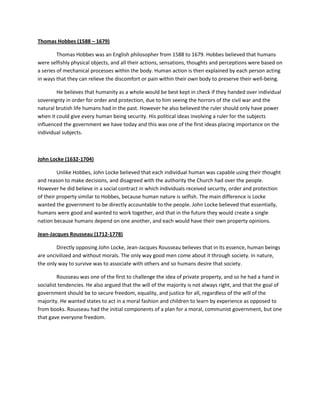Liberalism Philosophers
•Transferir como DOCX, PDF•
0 gostou•1,691 visualizações
Denunciar
Compartilhar
Denunciar
Compartilhar

Recomendados
Mais conteúdo relacionado
Mais procurados
Mais procurados (20)
Philosophers who influenced the development of liberalism

Philosophers who influenced the development of liberalism
THOMAS HOBBES’ MECHANISTIC VIEW OF THE HUMAN SOCIETY

THOMAS HOBBES’ MECHANISTIC VIEW OF THE HUMAN SOCIETY
Semelhante a Liberalism Philosophers
Semelhante a Liberalism Philosophers (15)
RESPOND to each post150 words EACHPOST ONEAs a result of havin.docx

RESPOND to each post150 words EACHPOST ONEAs a result of havin.docx
Week 1, Lecture B Do We Need A GovernmentOften we use words .docx

Week 1, Lecture B Do We Need A GovernmentOften we use words .docx
Chapter 11 Freedom in a Political and Cultural Context

Chapter 11 Freedom in a Political and Cultural Context
Mais de sarahehr
Mais de sarahehr (15)
What jrr tolkiens influences were and how these influences effected his writing

What jrr tolkiens influences were and how these influences effected his writing
What jrr tolkiens influences were and how these influences effected his writing

What jrr tolkiens influences were and how these influences effected his writing
Liberalism Philosophers
- 1. Thomas Hobbes (1588 – 1679)<br />Thomas Hobbes was an English philosopher from 1588 to 1679. Hobbes believed that humans were selfishly physical objects, and all their actions, sensations, thoughts and perceptions were based on a series of mechanical processes within the body. Human action is then explained by each person acting in ways that they can relieve the discomfort or pain within their own body to preserve their well-being. <br />He believes that humanity as a whole would be best kept in check if they handed over individual sovereignty in order for order and protection, due to him seeing the horrors of the civil war and the natural brutish life humans had in the past. However he also believed the ruler should only have power when it could give every human being security. His political ideas involving a ruler for the subjects influenced the government we have today and this was one of the first ideas placing importance on the individual subjects.<br />John Locke (1632-1704)<br />Unlike Hobbes, John Locke believed that each individual human was capable using their thought and reason to make decisions, and disagreed with the authority the Church had over the people. However he did believe in a social contract in which individuals received security, order and protection of their property similar to Hobbes, because human nature is selfish. The main difference is Locke wanted the government to be directly accountable to the people. John Locke believed that essentially, humans were good and wanted to work together, and that in the future they would create a single nation because humans depend on one another, and each would have their own property opinions.<br />Jean-Jacques Rousseau (1712-1778)<br />Directly opposing John Locke, Jean-Jacques Rousseau believes that in its essence, human beings are uncivilized and without morals. The only way good men come about it through society. In nature, the only way to survive was to associate with others and so humans desire that society. <br />Rousseau was one of the first to challenge the idea of private property, and so he had a hand in socialist tendencies. He also argued that the will of the majority is not always right, and that the goal of government should be to secure freedom, equality, and justice for all, regardless of the will of the majority. He wanted states to act in a moral fashion and children to learn by experience as opposed to from books. Rousseau had the initial components of a plan for a moral, communist government, but one that gave everyone freedom.<br />